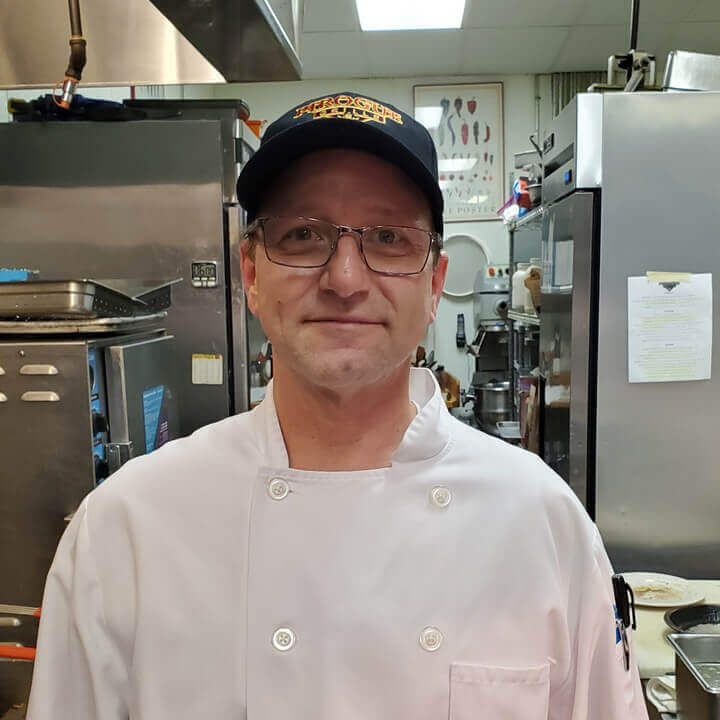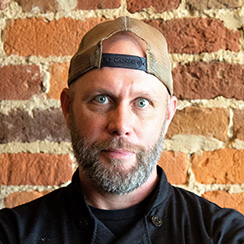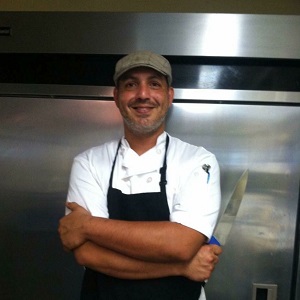You probably know at least a few people who have always known what they wanted to do with their lives. They listened to the cat’s heart with a toy stethoscope at age three and never wavered in their desire to be a veterinarian. Or maybe they started writing stories starring the neighborhood kids at age seven and then scribbled their way right into a creative writing program.
But choosing a career isn’t as straightforward for us all. For most of us, it’s about traveling a winding road full of twists, turns, roads-not-taken, roundabouts, switchbacks, and the occasional dead end.
And this can make it hard to decide what to do next.
If you’ve been mulling over a career in culinary arts, you may be hesitant to take the next step. Is it the right choice for you? How can you feel confident that you have a bright future in this industry?
Here’s how you might determine whether culinary arts is indeed the right career for you.
Why Choose a Career in the Culinary Arts?
The culinary industry has so much to offer, and its potential extends well beyond just the kitchen. There are culinary careers that can satisfy all manner of individuals, from people persons to introverted artistic types.
Of course, the kitchen is one of the most familiar arenas of the culinary arts. You may already be attracted to the environment—an energetic, exciting kitchen instead of a quiet office full of desks and computers sounds like a much more enjoyable way to spend a workday to many.
But why else might you choose to pursue a culinary career? Here are five great reasons!
1. Show Your Passion for Food and Service
If you spend your free time dreaming of new recipes, agonizing over how to recreate a dish from a local restaurant, or perusing the cheese selection at the grocery store with the intensity of a great explorer, you’ve likely been bitten by the food bug.
The most successful cooks and chefs combine a passion for food with a passion for great service to support a successful restaurant. They may not be the ones bringing the finished plate to the table. But they take pride in sending out a beautifully built dish, confident that it’s going to delight the person who receives it.
If food is your passion, you’re probably not going to be truly fulfilled in your career until you make it your primary focus.
2. The Culinary Industry Has Big Potential
The outlook for cooks and chefs looks bright.
According to the U.S. Bureau of Labor Statistics, the job market for cooks is expected to grow 6% by 2032. That represents over 175,000 new jobs in the industry. And for chefs and head cooks, things are looking nearly as good. The job market is expected to increase 5% in the same timeframe, with an increase of 9,200 jobs.
Compare that to the expected job growth across all industries—just 3%!
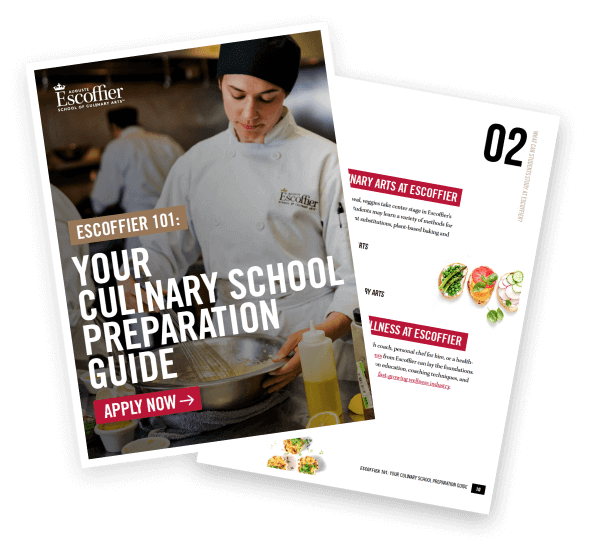
How to Enroll in Escoffier: Get the Essential Guide
Attending culinary school is a major decision! In this one-stop guide to Escoffier, explore what makes our school different, programs you can study, how to enroll, pay for your education, and more!
Considering these figures, the demand for cooks and chefs is likely going to increase over the next decade. Some restaurants may even offer higher wages and more benefits to attract kitchen talent.
A cook who starts their career now may be in a perfect position to benefit from all this growth over the next few years!
3. Even Small Kitchens Can Offer Your Career Upward Mobility
It can be difficult to grow in a small business in most sectors of the economy. In a single small retail location, you could go from cashier to manager, and that’s about it. Even in industries as attractive as tech, small companies often have one or two developers, and there’s nowhere to move in the company hierarchy unless a significant expansion occurs.
In the culinary arts, especially if you find yourself hired on as a prep cook or in a similar kitchen role, there are numerous opportunities for growth. This is one silver lining of the nearly 5% quit rate that restaurant kitchens experience: cooks and chefs are more likely to move on than employees in other industries. That opens up opportunities for you to work your way up, improving your resume and maybe even your paycheck as you go. And if you feel stuck in one kitchen and want to grow, there may be other restaurants ready to hire you at a higher position.
4. Culinary Arts Can Be the Doorway to Dozens of Other Careers
Maybe you love to cook, but you’re not 100% sure that you want to work in a restaurant kitchen.
That’s wonderful! You’ve identified something that lights you up and gets you excited. Fortunately, deciding you want a career in culinary is not the same as deciding you want a career in a restaurant.
There are many careers in the industry that are food related, inside and outside of the kitchen. There are artisan producers who make specialty chocolates, salsas, and other edible goodies. There are food critics who use their knowledge to assess the quality of local restaurants, and food writers who take an anthropological approach to cultural cuisines.
Research chefs develop new products for food brands. Chef consultants help restaurants to become more efficient or improve their operations. Food stylists focus on the aesthetics of the perfect plate for photos and film. Food bloggers make their own recipes and share them with the world, and food influencers keep their audience in-the-know on the local hotspots.
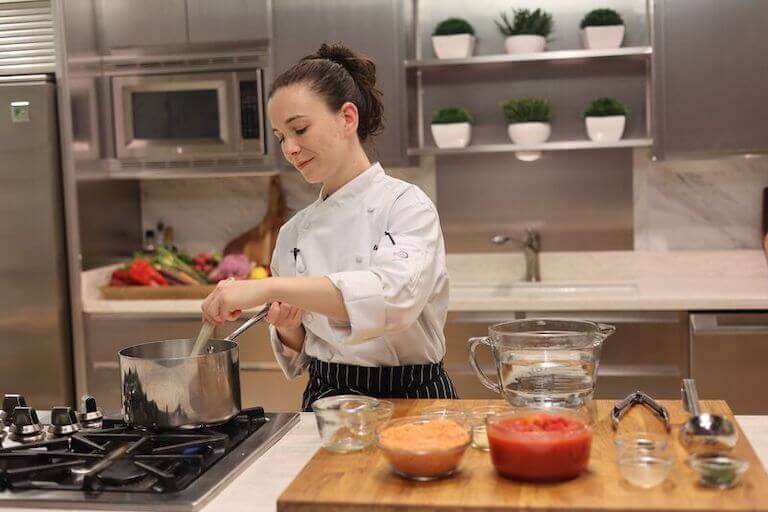
If you’re passionate about being in the kitchen, the culinary arts might be the career for you.
Getting the idea? There are dozens of ways to work in food. In fact, it could be one of the most versatile career options out there.
Regardless of which segment of the culinary industry you’re most excited about, a culinary education can help you get there. Employers often love to see an education on a resume. It can prove that the applicant is dedicated to their career. They’ve invested the time, energy, and money to grow their skills and become well-rounded cooks or culinarians. Culinary school grads can be more prepared to be in it for the long haul!
Chef Josh Hasho explains the benefits of a culinary education.*
5. Culinary Arts Allows You To Push Yourself and Improve Your Skills
Are you the type who loves to push yourself to be better?
Great chefs are constantly striving to improve. This could mean innovating and learning new skills to stay on the cutting edge of the industry. Or it could mean diving deep into a particular culinary tradition or technique, exploring it from all angles and across many different food styles to be the best at that one particular thing.
And as technology continues to improve, it’s finding its way deeper and deeper into restaurant operations. You may even find yourself learning new tech skills you wouldn’t have associated with culinary arts just a few years ago.
Starting in culinary school and continuing throughout their careers, the best cooks and chefs are on a constant path of learning and self-discovery, seeing how far they can push themselves and their creativity.
How to Know If a Culinary Career is NOT Right for You
Despite all of the potential benefits, no single career choice is suitable for everyone. The culinary arts can be exciting and rewarding, but that doesn’t mean that everyone would be happy as a cook or chef. If you see yourself in any of these descriptions, a culinary track may not be for you.
You want a 9-5 job
In some culinary jobs, like that of a food writer or research chef, a consistent 9-5 job is possible. But for many, the hours in the culinary industry vary. You may have to work evenings, weekends, and/or holidays. If you have other obligations or desires that make this difficult to imagine, you might be better off in another line of work
You prefer working alone
Preparing food for large groups requires working with a team. So if you’d rather be an army of one, culinary may not be the best choice. Of course, there are exceptions! You could open a small food truck… or you might be a solo food blogger or a private/personal chef… but even in these careers, you may find that you need some help.
You’re after fame and fortune
The Bobby Flays and Ina Gartens of the world are anomalies. It takes a tremendous amount of hard work and an equal if not superior amount of luck to find yourself in the culinary limelight. Most cooks and chefs are not celebrities, and they are not rich. They do it for the love of the craft, not the love that gets heaped onto them from an adoring public.
If you’re only into food for the accolades or the attention, you may be disappointed and unhappy if they don’t come.
You prefer the beat of your own drum
The kitchen hierarchy, also called the brigade de cuisine, was invented by our namesake, Auguste Escoffier. Modeled after military ranks, it creates a clear chain of command and keeps a kitchen running smoothly. To work as intended, this model requires all team members to faithfully follow their leader and execute tasks as assigned.
If you don’t follow instructions, the whole kitchen can break down! So you must be willing to do your part as instructed to keep the operation running.
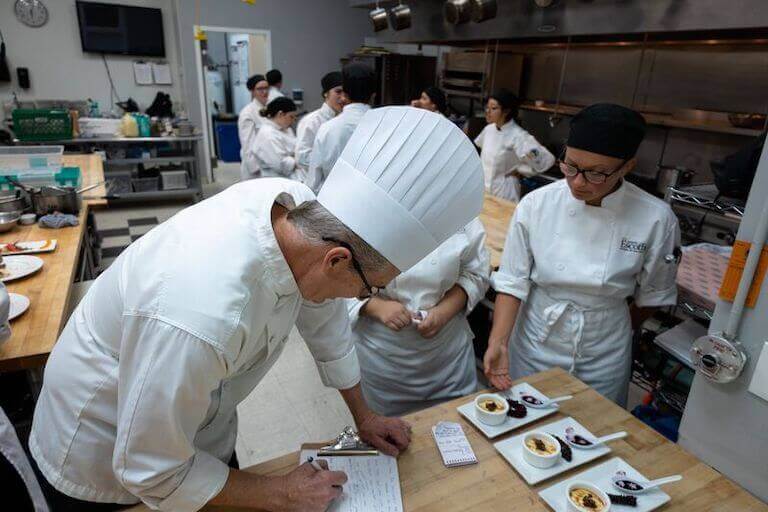
A culinary career isn’t for everyone, and that’s ok. If you are a self starter, enjoy hustle and bustle, and can tap into your creativity, it might be for you.
How Culinary School Can Prepare You For a Successful Culinary Career
As daunting as it can be to embark on a new career path, the good news is that you don’t have to go it alone. A culinary education can give you the tools you need to succeed in the industry. Utilizing mentors who are experts in their fields and spectacular educators can increase the speed at which you grow and advance within your career.
Culinary School Can Give You Strong Fundamentals in Cooking and Flavor
Every expert must start with the fundamentals. In the culinary space, this includes the basics like knife skills, cooking techniques, flavor profiles, and sanitation. It’s on these foundations that the rest of your cooking expertise will be built.
In culinary school, students are generally exposed to these principles by experienced Chef Instructors. But culinary school goes beyond these basics. Students can also be introduced to a variety of world cuisines, with flavors they may have never experienced before. They may explore the basics of baking, so they can approach breads and other baked goods from a scientific perspective. They can explore business topics as well, like menu planning and pricing, foodservice operations, and even communication skills.
Culinary school graduates are not immediately considered chefs. They haven’t yet earned that title. But with their new skills, they can be ready to take the next step into the professional world to hone their skills. Some students find that their time in culinary school may allow them to make much faster progress through the ranks than they could have otherwise!
Your Time in School Can Help You Chart Out Your Next Steps
What if you don’t know where you want your culinary career to take you? As long as you have a passion for food and cooking, you can start your culinary education. In culinary school, you can choose a program like Food Entrepreneurship, Holistic Nutrition and Wellness, or baking and pastry. But you don’t have to choose a specific career goal.
Students can explore culinary basics, world cuisines, business and entrepreneurship, and more—valuable lessons that graduates can take with them wherever they go.
In fact, some students discover where they want to take their careers during their time in school. It can be a place for personal discovery as well as a place for technical learning.

The skills you learn through your culinary arts education can allow you to dish up delicious entrees and sides.
So… Are the Culinary Arts a Good Career For You?
If you’re passionate about food and want to work in an industry that expects big growth in the coming years, culinary arts could be the perfect place for you to build a career. Best of all, you can get experience and connections by starting with a culinary education.
Escoffier’s diverse program assortment can prepare you for success in any specialty. Our online programs also offer you the opportunity to fit your education around your current life and obligations. If you have questions about Escoffier’s programs, our Admissions Department is here to help. Contact us to get the answers you need and start planning your career in culinary arts.
TO LEARN MORE CAREERS IN THE CULINARY ARTS, TRY THESE ARTICLES NEXT:
- How to Become a Michelin Star Chef
- 5 Alternative Careers Out of Culinary School
- What It Takes to Be an Executive Chef
*Information may not reflect every student’s experience. Results and outcomes may be based on several factors, such as geographical region or previous experience.
This article was originally published on May 5, 2022 and has since been updated.


